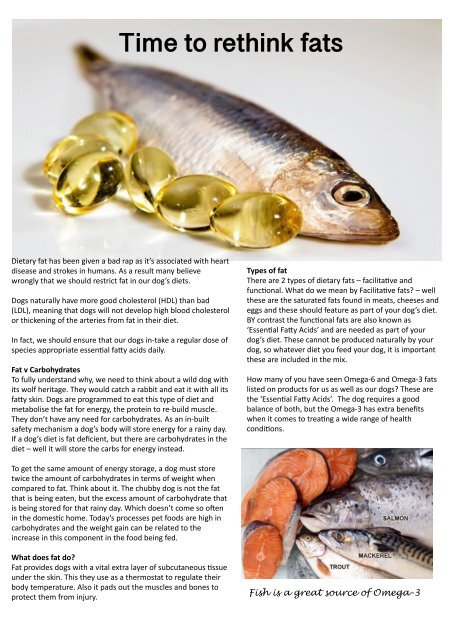The Aussie - Spring 2019
Magazine only for Members of the Southern Counties Australian Terrier Club
Magazine only for Members of the Southern Counties Australian Terrier Club
You also want an ePaper? Increase the reach of your titles
YUMPU automatically turns print PDFs into web optimized ePapers that Google loves.
Time to rethink fats<br />
Dietary fat has been given a bad rap as it’s associated with heart<br />
disease and strokes in humans. As a result many believe<br />
wrongly that we should restrict fat in our dog’s diets.<br />
Dogs naturally have more good cholesterol (HDL) than bad<br />
(LDL), meaning that dogs will not develop high blood cholesterol<br />
or thickening of the arteries from fat in their diet.<br />
In fact, we should ensure that our dogs in-take a regular dose of<br />
species appropriate essen?al faUy acids daily.<br />
Fat v Carbohydrates<br />
To fully understand why, we need to think about a wild dog with<br />
its wolf heritage. <strong>The</strong>y would catch a rabbit and eat it with all its<br />
faUy skin. Dogs are programmed to eat this type of diet and<br />
metabolise the fat for energy, the protein to re-build muscle.<br />
<strong>The</strong>y don’t have any need for carbohydrates. As an in-built<br />
safety mechanism a dog’s body will store energy for a rainy day.<br />
If a dog’s diet is fat deficient, but there are carbohydrates in the<br />
diet – well it will store the carbs for energy instead.<br />
Types of fat<br />
<strong>The</strong>re are 2 types of dietary fats – facilita?ve and<br />
func?onal. What do we mean by Facilita?ve fats? – well<br />
these are the saturated fats found in meats, cheeses and<br />
eggs and these should feature as part of your dog’s diet.<br />
BY contrast the func?onal fats are also known as<br />
‘Essen?al FaUy Acids’ and are needed as part of your<br />
dog’s diet. <strong>The</strong>se cannot be produced naturally by your<br />
dog, so whatever diet you feed your dog, it is important<br />
these are included in the mix.<br />
How many of you have seen Omega-6 and Omega-3 fats<br />
listed on products for us as well as our dogs? <strong>The</strong>se are<br />
the ‘Essen?al FaUy Acids’. <strong>The</strong> dog requires a good<br />
balance of both, but the Omega-3 has extra benefits<br />
when it comes to trea?ng a wide range of health<br />
condi?ons.<br />
To get the same amount of energy storage, a dog must store<br />
twice the amount of carbohydrates in terms of weight when<br />
compared to fat. Think about it. <strong>The</strong> chubby dog is not the fat<br />
that is being eaten, but the excess amount of carbohydrate that<br />
is being stored for that rainy day. Which doesn’t come so o\en<br />
in the domes?c home. Today’s processes pet foods are high in<br />
carbohydrates and the weight gain can be related to the<br />
increase in this component in the food being fed.<br />
What does fat do?<br />
Fat provides dogs with a vital extra layer of subcutaneous ?ssue<br />
under the skin. This they use as a thermostat to regulate their<br />
body temperature. Also it pads out the muscles and bones to<br />
protect them from injury.<br />
Fish is a great source of Omega-3









